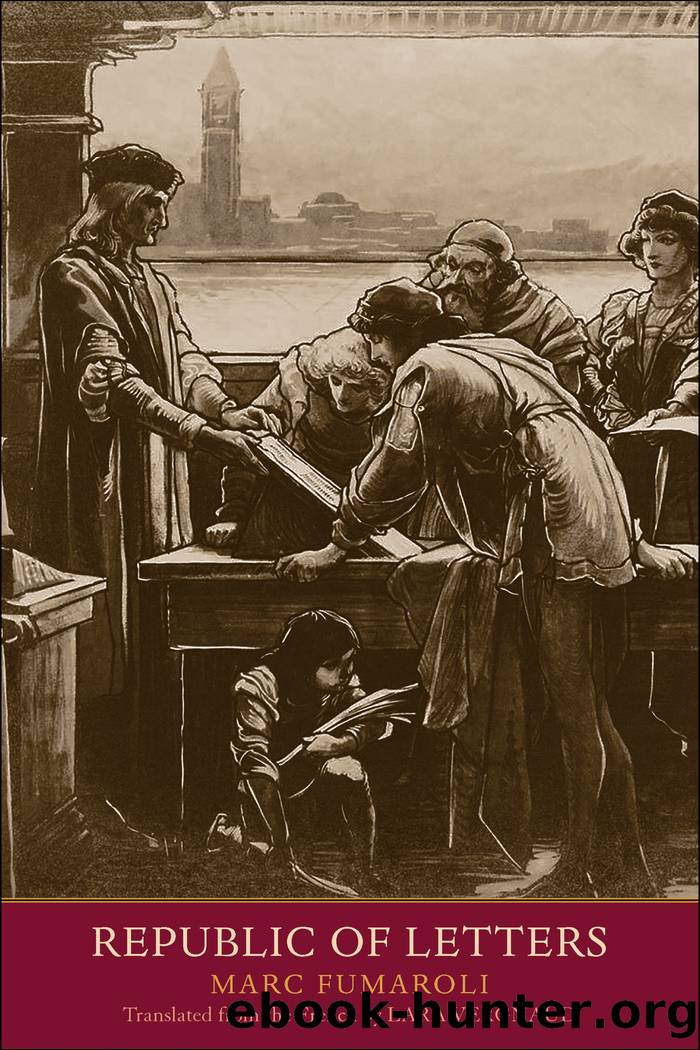The Republic of Letters by Marc Fumaroli

Author:Marc Fumaroli
Language: eng
Format: epub
Publisher: Yale University Press
Published: 2018-08-14T16:00:00+00:00
12
MARSILIO FICINO’S DE TRIPLICI VITA:
A REGIMEN FOR THE REPUBLIC OF LETTERS?
As I do not claim to be a specialist of Ficino and fifteenth-century Florentine humanism, in this chapter I simply intend to propose a hypothesis for study and reflection: Is there not a link between the notion of the “renaissance of good letters” introduced by Petrarch in the fourteenth century, the notion of a Republic of Letters introduced in the beginning of the fifteenth century within Poggio Bracciolini’s network, and the guide to health, long life, and spiritual fertility for men and women of letters published in 1489 by the philosopher and doctor Marsilio Ficino, under the title De triplici vita? If so, the work’s reception in Europe between the sixteenth and eighteenth centuries would be intimately linked to the history of the Republic of Letters and the fate of the Renaissance.
In the first pages of book 1 (On Caring for the Health of Those Who Devote Themselves to Literary Studies), Ficino suggests that he is the first to address the specific nosology of the studious.1 As observes A. Tarabochia Canavero in the notes to her Italian translation, De triplici vita is in reality part of a quasi-uninterrupted tradition, beginning with Petrarch, which also produced works by doctors such as Antonio Guainerio da Pavia and Constantino Africano in the fourteenth and fifteenth centuries.2 However, the scale and ambition of the three essays assembled in De vita, acknowledged and celebrated by Ficino himself, fully justify the author’s claim. Furthermore, the work’s intended audience—the “priests of Minerva” themselves and the powerful humanist patrons to whom Ficino dedicated each of his three books (Lorenzo de’ Medici, Philippe Valori, and the king of Hungary Matthias Corvin)—manifestly formed a unit to which Ficino himself belonged and to whom he made clear that they were tasked with a great mission and responsibility. So De vita was not a medical regimen applied to the needs of a broad social category, in the vein of—as Aristotle, Plato, and Galen might have offered—a guide for family men and another for preceptors. Instead, the poem (prose-poem?3) in book 1, addressed to Lorenzo, links a renewed and quasi-sacred form of medicine to the Bacchic mysteries. Its objective was to maintain the “priests of Minerva,” viewed by Ficino as the humanists of today and tomorrow, in long-lasting vibrant health. This “Ficinian” medicine, though built on tradition, appears to be the response to a precise historical content, which assigned a fortuitous and essential task to Ficino, Lorenzo and Cosimo de’ Medici, and the men of letters within their circle.
In the background of De triplici vita, the reader can sense Ficino’s keen awareness, both astronomical and historical, of his era and the “revolution” (in the technical connotation this term had in astronomy) to which it bore witness. That astro-historical awareness of time (if I can call it that) was accompanied by an intense concern for the men tasked with carrying out said “revolution.” Here, Ficino was not thinking of the clergy in general, and
Download
This site does not store any files on its server. We only index and link to content provided by other sites. Please contact the content providers to delete copyright contents if any and email us, we'll remove relevant links or contents immediately.
| Africa | Americas |
| Arctic & Antarctica | Asia |
| Australia & Oceania | Europe |
| Middle East | Russia |
| United States | World |
| Ancient Civilizations | Military |
| Historical Study & Educational Resources |
Magic and Divination in Early Islam by Emilie Savage-Smith;(1534)
Papillon by Henry Charrière(1440)
Bohemians, Bootleggers, Flappers, and Swells: The Best of Early Vanity Fair by Bohemians Bootleggers Flappers & Swells- The Best of Early Vanity Fair (epub)(1419)
Ambition and Desire: The Dangerous Life of Josephine Bonaparte by Kate Williams(1394)
Twelve Caesars by Mary Beard(1324)
What Really Happened: The Death of Hitler by Robert J. Hutchinson(1167)
Operation Vengeance: The Astonishing Aerial Ambush That Changed World War II by Dan Hampton(1164)
London in the Twentieth Century by Jerry White(1149)
The Japanese by Christopher Harding(1133)
Time of the Magicians by Wolfram Eilenberger(1131)
Twilight of the Gods by Ian W. Toll(1123)
Lenin: A Biography by Robert Service(1080)
The Devil You Know by Charles M. Blow(1028)
A Social History of the Media by Peter Burke & Peter Burke(985)
Freemasons for Dummies by Hodapp Christopher;(966)
Napolean Hill Collection by Napoleon Hill(948)
Henry III by David Carpenter;(924)
The Rise and Triumph of the Modern Self by Unknown(923)
Richard III (The English Monarchs Series) by Charles Ross(913)
